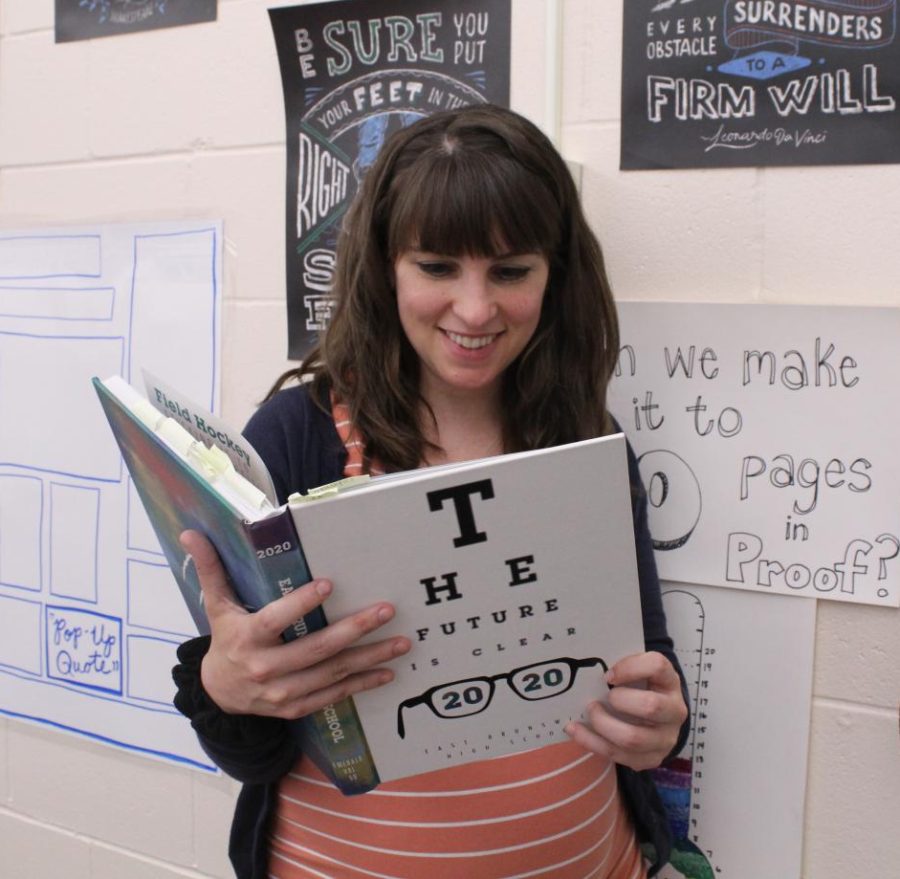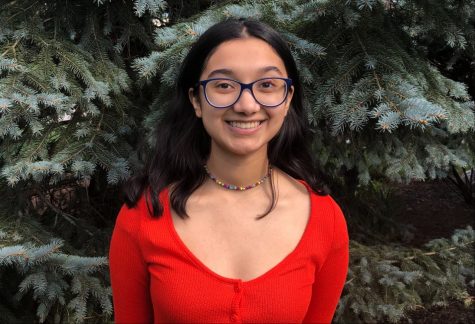Finding Vulnerability and Forgiveness Through Art: Mrs. Roman’s Creative Process
Mrs. Roman shares with us the value in vulnerability and how art has shaped her life.
Mrs. Roman, who just went on maternity leave, is a little nervous but also excited to be a mom. She says: “I just think I’m going to be creative in a different way. I think I’m going to be creative in how I care for my child. Maybe I will be creative through my child in a way, like sharing art and music and inspiring him to create as well.” Here, she is pictured looking back on a past yearbook that she created.
May 13, 2022
As I head into what will end up being a forty minute discussion with EBHS teacher Mrs. Rachel Roman, I feel relaxed. She is turned completely towards me, her feet facing mine, always open and welcoming. We actually spend the first fifteen or twenty minutes talking about my personal projects, something I’ll come to learn that Mrs. Roman does with all of her students.
Mrs. Roman teaches four different classes – Interior Design, Publisher’s Workshop, Humanities, and Illustrating the Written Word – and she also curates the entirety of our yearbook. Every school day is spent being creative, but for and with her students. She told the Hub: “I spend all my time and [I] allot all my energy for my students’ art and projects and then when it’s time to work on my own stuff, I often feel completely depleted. It’s a little depressing.”
She goes on to talk about how she tries to stay creative for herself: “It’s really hard when you feel depleted and stressed and overwhelmed in your life to want to make work. But if I go to an art museum, for example, oh my gosh, I have, like this resurgence of creative energy. If I take a tour around an art museum and I learn about the artist’s reasons for making the work that they make, it makes me contemplate the reasons why I make art to begin with and it makes me want to continue with my artistic practice.”
Mrs. Roman’s ‘artistic practice’ stretches far beyond the confines of her classroom. She has played the drums for multiple bands, composes her own piano music, and paints original pieces – some of which have been featured in art galleries. Although Roman always knew she wanted to pursue the arts, she grew up in an area that isn’t necessarily known for its artsy side and is actually in danger of losing some of its history. She explains that mainstream, downtown Flemington, where she grew up and describes as a “farm town, quiet, you know, wasteland of nothing”- is currently under construction in order to make it more “sterile and a lot less historical.” She describes a Flemington coffee shop that is in danger of being destroyed as her “safe space”, where she and her friends would often perform poetry or original songs, and the urge to save the space for future generations of artists.
She opened up about her time in high school: “I struggled. It really was a time where I was struggling and art was where I found comfort. It is definitely a form of therapy and healing for me. It’s a completely new documentation of your life. Like, I’ll be creating something and I’ll have the intention of it looking a certain way or you know, saying something in particular, and then years later, I’ll look at it and I’ll be like, ‘Oh, this is me reflecting on this really hard thing that I was going through’. That’s why I painted this, or that’s why I made the song about this particular situation. It’s not because I thought it meant this thing. It really meant this other thing. And then to look back on those pieces and remember the emotions you felt during that time and be so much kinder and forgiving towards yourself for who you were back then. That’s what art is, I think. Forgiveness.”
As she says the word “forgiveness”, Mrs. Roman sits back and nervously smiles at me, as if to confirm that her response answered my question well enough. I am about to ask her my next question, but instead she asks me what my high school experience has been like. I talk about struggling to fit in in middle school when I first moved to East Brunswick and how I didn’t feel inspired enough to write anything for myself for a couple of years before finally publishing a short story during sophomore year. I tell her about feeling depressed and lost and feeling so much regret when I look back at my diaries from middle school. She never broke eye contact with me once as I spoke. It actually unsettled me a little bit. I’m not used to having this much attention.
Her eyes light up when I tell her that I’m drafting my own novel, and she claps her hands. “Alefiya, thank you so much for sharing this,” she says, “vulnerability is so important, and it’s nice that you’re able to be open.”
She continues: “I’m so happy that you were able to find yourself again through writing. Do you find that you feel better about your past when you read your diaries or past stories?”
I shrug. “I don’t know. Maybe after this conversation, I can be a little more forgiving and sympathetic towards middle school me.”
“Yeah, I hope so. And that’s the thing, you know. Everyone should be able to be vulnerable and forgiving and kinder to themselves. That’s what art helps a lot of us do. I think everyone has got some level of creativity in them, and you can learn how to be creative too. That’s what I like to share with my students in Humanities, that we’ve all got that creative bug in us. It’s just a matter of finding it, you know?”



